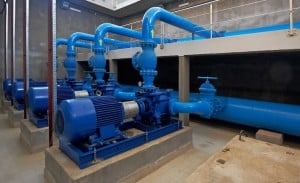When many businesses decide they need a pump, they fail to consider a number of crucial factors. In today’s competitive business climate, many industrial plant executives ask two questions: “What is the smallest capacity we can get away with” and “How cheap can we get it?” This is not the way to find the pump that is going to work the best for your business.
 In fact, it is much more expensive to choose the wrong pump and have downtime or even sustain damage as the result of pump malfunction. So, what other factors should you be taking into consideration? You need to know exactly what your operational requirements are to find the pump that meets those requirements best.
In fact, it is much more expensive to choose the wrong pump and have downtime or even sustain damage as the result of pump malfunction. So, what other factors should you be taking into consideration? You need to know exactly what your operational requirements are to find the pump that meets those requirements best.
Once you have an idea of what kind of pump you want and what capacity you should have, then you will want to check out vendor experiences with a number of models: efficiency and ease of operation, for example. You also want to find out what kind of pump seal system is appropriate for your needs.
Optimum Pump Selection
Whether you use a bidding process or not, you should want the best pump, not the least you can get away with. The rule of thumb: you not only want the pump with the highest BEP (Best Efficiency Point), but you also want the operating range of the selected pump to be as close to that point as possible.
Vendor Experience
This is also called a “pump model reference check.” This should really be the most important criterion because it comes from experience. Any manufacturer can theorise why their pump works well and some are really great at selling. But you want a pump that has tried and tested with results in operations similar to yours.
Operational Experience and Application Details
Every pump is great for some applications but not appropriate for others, because it will perform differently in different systems. In other words, the application for which you use the pump will affect its performance and its reliability. You have to match the right pump with the right application or even the best pump can fail.
Putting it into Action
Rule #1: don’t price point your pump. Period. There is no greater predictor of pump failure than making your decision based solely on price. Initial purchase price is always an important factor when investing in a piece of equipment, however it should never be the only consideration. Instead, make sure that you discuss every requirement and how every pump can meet all of them so it is a good idea to make sure that you know exactly what is included in any price quote.
Some good things to know: pump shaft length, pump shaft diameter and pump bearing details. Pump shaft slenderness ratio, which is obtained by dividing the length by the diameter, is also important because the more slender the shaft is, the more prone it is to vibration, stress and deflection. Bearings need to be as large as possible to last longer.
Self Priming Pumps
For any pump that needs priming, we recommend a self-priming pump for two reasons. First of all, in the case of entrained air or gas, the pump can force it out and resume normal operations. Second, if you have a pump that needs to be primed, you will have to add another step and more equipment to your system. This costs money and is one more thing that can go wrong.
Pump Impeller Assembly
There are many different impeller designs, probably the most common design in a centrifugal pump is closed impeller. For most applications, this will be your most efficient option. Since the liquid is contained within, there are less variables that could affect flow. Also, a closed-type impeller is generally the most reliable of the designs.
Pump Seal
The most common cause of unscheduled pump shutdowns is the pump seal. Pump seal maintenance is sometimes an expensive maintenance cost. Many pumps will require seal replacement from once a year to once every three years.
Whenever possible, use the original seal, however another option is a cartridge seal design. It is safer, simpler and very reliable. Cartridge seals are available for most kinds of pump applications.
Vertical Inline Pumps
For plants with small to medium-sized applications, vertical pumps are the most cost-effective due to their simple and compact nature. They have multiple uses and are normally very cost effective options for cleanwater high pressure pumping applications.
Pump Solutions Australasia Can Help
Always call us here at Pump Solutions Australasia with any questions or for help in selecting the correct pump system for your business. We have many years of experience with large and small businesses for literally all applications.
We can help you find the right solution the first time, saving you time and money. Call 1300 922 973 to learn more.
